Budgeting for India’s Energy Transition
Analyzing public financial flows in India and their impacts on the energy transition
In recent years, India has positioned itself as an international climate leader, calling for global renewable energy capacity to rise while also funding decarbonization measures to decouple its fast-growing economy from greenhouse gas emissions and reach net-zero targets.
However, considerable challenges remain, particularly in reducing fossil fuel dependency, supporting new and renewable energy sources, and ensuring a just energy transition.
IISD work highlights both progress and further reforms that are needed as India aims to achieve 50% of electricity generation from non-fossil sources by 2030 and hit net-zero by 2070.
What are the energy headlines from India's Union Budget 2024?
Energy Inventories

Budgeting for Net Zero
This study estimates the cost gap for battery energy storage systems (BESSs), offshore wind, solar photovoltaic (PV), electric vehicles (EVs), and green hydrogen (GH2) to inform government support.
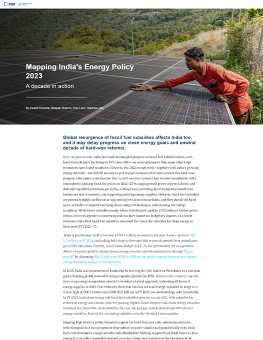
Mapping India's Energy Policy 2023
Mapping India's Energy Policy 2023 is the latest publication in a series of annual updates on government support for energy in India that includes critical data on energy subsidies and taxation.
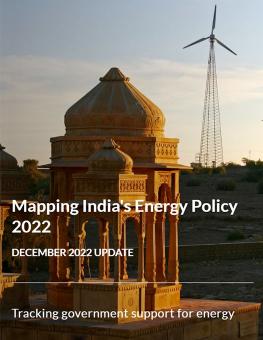
Mapping India's Energy Policy 2022 (Update)
This study gathers and analyzes data on Indian government support for fossil fuels and clean energy for fiscal years 2014–2022.
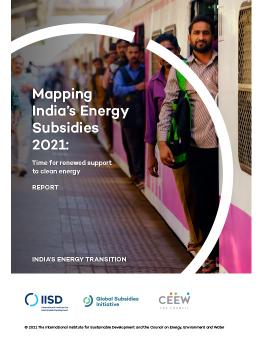
Mapping India's Energy Subsidies 2021: Time for renewed support to clean energy
This report estimates India's energy subsidies over seven years and analyzes the implications for national clean energy targets.
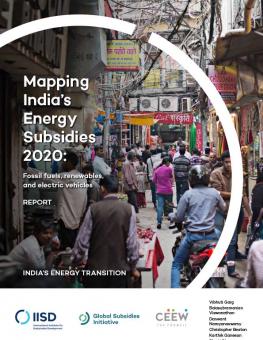
Mapping India's Energy Subsidies 2020: Fossil fuels, renewables and electric vehicles
How have India’s energy subsidy policies changed? What have been the most significant developments in India’s dynamic energy policy environment? And is public support aligned with India’s desired energy future?
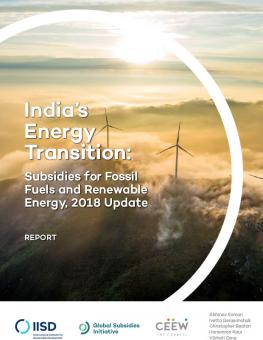
India's Energy Transition: Subsidies for Fossil Fuels and Renewable Energy, 2018 Update
How have India’s energy subsidy policies changed since 2016? Have they become more or less aligned with India’s desired energy future? How have India’s energy subsidy policies changed since 2016? Have they become more or less aligned with India’s desired energy future?
Media Coverage
India's Energy Subsidies High; Fossil Fuel Subsidies More Than Renewables: Report
India subsidised a whopping Rs 3.2 lakh crore energy sources, including fossil fuels and renewable energy in the fiscal year 2023, as per a report by the International Institute for Sustainable Development (IISD).
India's energy subsidies reach 9-year peak at $39.3 billion amidst global crisis
India's energy subsidies have soared to a record $39.3 billion in the fiscal year 2023, marking a nine-year high, according to the latest findings. The surge is attributed to the nation's broad-based strategy to enhance its energy supply in light of the 2022 global energy crisis and its burgeoning energy needs.
India faces clean energy challenges as energy demand soars, global fossil fuel subsidies rise
The 2022 global energy crisis, together with India's growing energy demand, has led the country to adopt a hybrid approach, expanding all forms of supply in 2023. This approach has pushed India's total energy subsidies to 9-year high of USD 39.3 billion for the fiscal year ending 2023, states a new IISD report.
View: India should ramp up consumer subsidies for EVs, instead of rolling them back
India's cuts in subsidies to electric two-wheeler EVs could impede growth in the sector. To support policy goals, India needs to boost support for EVs across the value chain, experts explain.
How can the budget unlock India’s future as an offshore wind powerhouse
The Government of India approved a ₹7,453 crore offshore wind funding scheme. Experts stress larger financial support will be needed to ensure the sector's sustainable growth.
You might also be interested in
Establishing a Consortium for “Public Good” Data on the Politics of Energy Transition [ICP 2020]
This project will create “public good” datasets on politics influencing (1) energy in recovery programs and (2) fossil fuel pricing and inequality.
Fossil-Free Recovery
How governments can raise money from fossil fuel subsidy reform and taxation and spend it efficiently for a resilient and sustainable society.
IISD Next: Campus Workshop Series on Sustainability
A free workshop series on sustainability to educate and empower youth worldwide with tools on policy, sustainable development goals, and more.
Normalizing No New Fossil Fuels
There is no room for new fossil fuel projects under a 1.5°C global warming limit. New research explores how countries and the public can establish “no new fossil fuels” as a benchmark for climate leadership.





